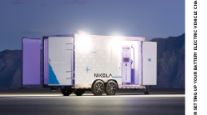Israeli Entrepreneur Races Tesla to Get Electric Trucks on Road

Tevva Motors Ltd., headed by a former Israeli submariner who’s vying with Elon Musk’s Tesla Inc. to develop electric-powered trucks, secured a major investment that will enable it to put the vehicles on the road this year.
Fifteen 7.5-ton electric-powered trucks will be delivered to UPS Inc. in the U.K. this summer, following a successful trial last year, and the company is in expansion talks with 30 logistics firms worldwide, including the U.S., Europe, China, Israel and India.
UPS ranks No. 1 on the Transport Topics Top 100 list of the largest North American for-hire carriers. Tevva raised about $15.7 million in a funding round June 14, led by Bharat Forge of Pune, India, which paid $13.2 million for a 35% stake in the company, according to Asher Bennett, Tevva founder and CEO.
RELATED: German electric carmakers pose threat to Tesla
“This investment allows us to scale up, grow our production, move into new geographies, and continue to develop our next-generation technology,” Bennett said by phone June 18.
Tesla is developing an electric-powered semitrailer with a range of up to 500 miles, due in 2019.
“The race to produce zero-emissions trucks is on, and this is a very interesting and innovative development from Tevva,” said Matt Finch, a business and economic analyst at the Energy and Climate Intelligence Unit think tank in London.
“The idea of a range-extended truck is nothing new, but software that can work out when the battery should provide energy to a truck and, innovatively, when it shouldn’t, is,” Finch said by e-mail June 18.
Submarine Technology Buoys Trucks
The main challenges for the electric-truck market are range anxiety and lack of recharging infrastructure, said Bennett, a former Israeli submarine officer and brother of Israeli Education Minister Naftali Bennett.
“The propulsion in our submarine was a battery and electric motor and we had backup energy from onboard generators. I moved similar technology to our truck,” he said.
RELATED: Electric vehicles could displace 8 million barrels of oil per day by 2040
Tevva’s energy management software also is inspired by submarine technology that plans routes and fuel consumption days ahead. “I automated and computerized that concept into our electric trucks,” Bennett said.
The company’s 74 kilowatt-hour lithium-ion battery fuels an electric motor that powers a 7.5-ton truck for about 100 miles.
A diesel-fueled generator can recharge the battery while the truck is in motion, extending the range to 450 miles.
RELATED: With promised semi on the horizon, Tesla cuts 9% of workforce
Fuel costs about 8 cents a mile, according to Bennett. The battery can be recharged from a normal electric socket in one to three hours or overnight, depending on choice.
“As the truck moves along, a cloud-based system is communicating with the truck, looking ahead to the rest of the route, traffic, weather and emission levels and making smart decisions on the best way to utilize the different available on-board energy systems,” he said. A regenerative braking system produces electricity, saving up to 25% of the vehicle’s energy needs.
Tevva’s trucks cost about 50% more than their diesel equivalents, but save 80% on fuel and maintenance, Bennett said.
Tesla’s battery push won’t make Tevva’s technology redundant, Bennett said.
“I’m a huge admirer of Tesla,” said Bennett. “Their focus is on pure batteries, which works really well for consumers and car operators. Time will tell if it’s a good solution for trucks.”
“They are very focused on the USA and very large trucks. We’re very focused on trucks that go around our cities and urban deliveries. It’s a completely different world of solutions and needs,” he said.




